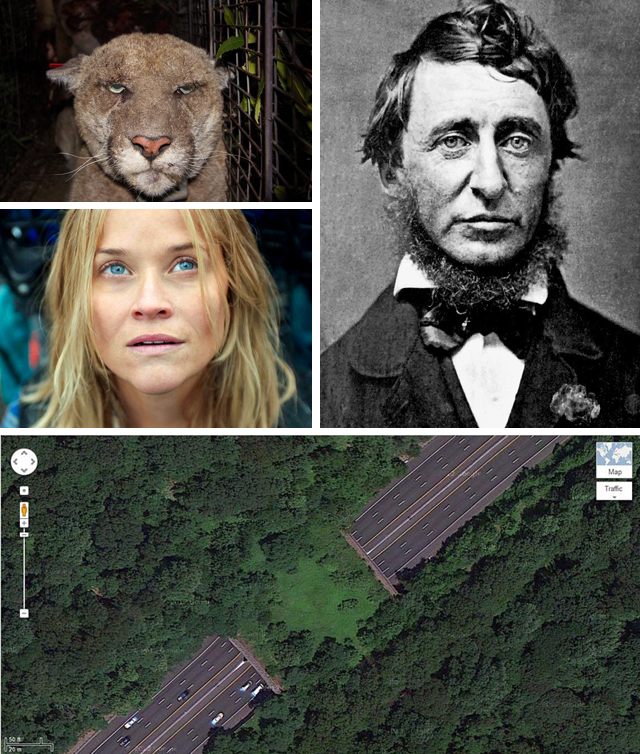

Welcome to my final post of 2014, an end-of-the-calendar-year dispatch from the remote island I call home. Over the past twelve months, I have intercepted a loosely interwoven array of news stories from across the internetworked ether; each story speaks of a strange border: the hazy line that defines what we call “civilization” by dividing it from its opposite. This MadBlog entry provides a report on these reports, designed to ponder/wander that border, and composed in a slightly nonlinear fashion. Shortly, you will be asked to choose one of three paths to wander.
But first, a few introductory notes. I’ve just read some reviews of the recently released film, Wild, based on Cheryl Strayed’s memoir about hiking the Pacific Crest Trail all alone. Reese Witherspoon plays the lead, who, according to Stephanie Zacharek of the VillageVoice, decides “to fill up a backpack that will end up being bigger and bulkier than she is and head out into the cruel and beautiful natural world, a place where surely she’ll be able to find herself, or something.” The movie flits between flashbacks of the character’s life in civilization and her lonely time in the great outdoors, making it something of a one-woman show, at least in spurts. As Edward Douglas puts it in a write-up on Comingsoon.net, “There are many scenes with very little actual dialogue since Cheryl is mostly out in the wild by herself.” Despite being structured around prominent silences, the film is garnering acclaim and award buzz for the star, the screenwriter (Nick Hornby), and the director (Jean-Marc Vallee). This follows in the footsteps of other recent films about characters struggling in harsh and isolated conditions: All Is Lost, Gravity, Captain Phillips, and the very recent Tracks, about an Australian woman’s survival odyssey, which has already drawn plenty of comparison to Wild. What I want to point out about the movie is not just “the cruel and beautiful natural world” into which the character boldly ventures, but something more subtle: the common but curious grammatical construction used in both of the above quotes: Zacharek’s “out into” and Douglas’s “out in.”
It is clear that woods and wilderness are out: out of doors, out of the city, and sometimes even out of range for mobile phone service. I leave my house and I am outside, that is, on the side of the walls that is considered out rather than in. But once I go far enough out there, deep enough, then I am in: in the wilderness, in the woods, in the forest, in the jungle, in the bush. Inside the outside, or out in. This terminological coupling of opposites happens frequently when we tell stories like Wild.
And now, a spot of nepotism, because my great great great granduncle once removed had something to say on this subject. While the writings of Henry David Thoreau are certainly not hot off the presses, his name did make a blip on my news feed just 2 weeks ago. Included in the latest recipients of funding from the National Endowment for the Humanities is a game called “Walden.” Developer Tracy Fullerton’s project “will put the player inside the head of one of America's seminal literary men, Henry David Thoreau, as he explores the pleasures and challenges of solitude and contemplation during an extended stay beside Walden Pond in Concord, Mass., circa 1845,” reports the Los Angeles Times. Intriguing! An immersive computer game about being alone in the wild; I shall have to acquire a copy to help pass the lonely hours here on the Island.
Returning to this MadBlog’s point, however, it occurs to me that Granduncle Henry’s thinking provides a fitting lens through which to read our recent news regarding the out in, when and where we see movement between civilization and wildness. I’ll endeavor to sketch, with a Thoreauvian pencil, the principle of the out in.
For Thoreau, the out in applies in equal measure to the soul of the individual and to the foundations of civilization. “The story of Romulus and Remus being suckled by a wolf is not a meaningless fable,” he explains in his love letter to Wildness, an 1862 essay simply titled, “Walking." “The founders of every state which has risen to eminence, have drawn their nourishment and vigor from a similar wild source.” If this is true, then we should be able to find a stream, or at least a trickle, feeding civilization from this wild source today. Let’s see…
There are three paths through this semi-wild wood. In each, I endeavor to apply Granduncle Henry’s musings to current events. No need to read them all, but please do choose one: